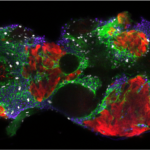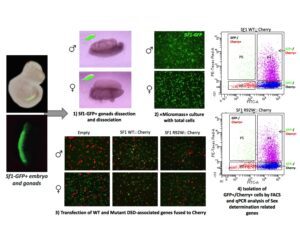Présentation
Our data on the role of nuclear receptors in human ovarian development and the repression of WNT signaling during mammalian testis formation suggests the main function of pro-testis genes may be to antagonize pro-ovary regulatory pathways. For the first time, we identified a series of specific mutations in key nuclear receptors and co-factors, that allow testis to be formed in 46,XX individuals (Figure 5).
Figure 5. Mouse micromass culture to understand how mutations in nuclear receptors causing DSD disrupt the sex-determination process. The gonad from E13.5 Sf1(Nr5a1)-GFP XX and XY embryos are dissociated, cultured and transfected with SF1-mCherry. Double fluorescent cells (GFP+/mCherry+)are collected by flow cytometry, cultured and analysed.
We also discovered that WT1 protein lacking ZF4 can function as a pro-testis factor in an XX chromosomal context. This project explores the expression and role of nuclear factors and WT1 in human ovarian determination and whether they form a regulatory complex/pathway during granulosa cell development.





